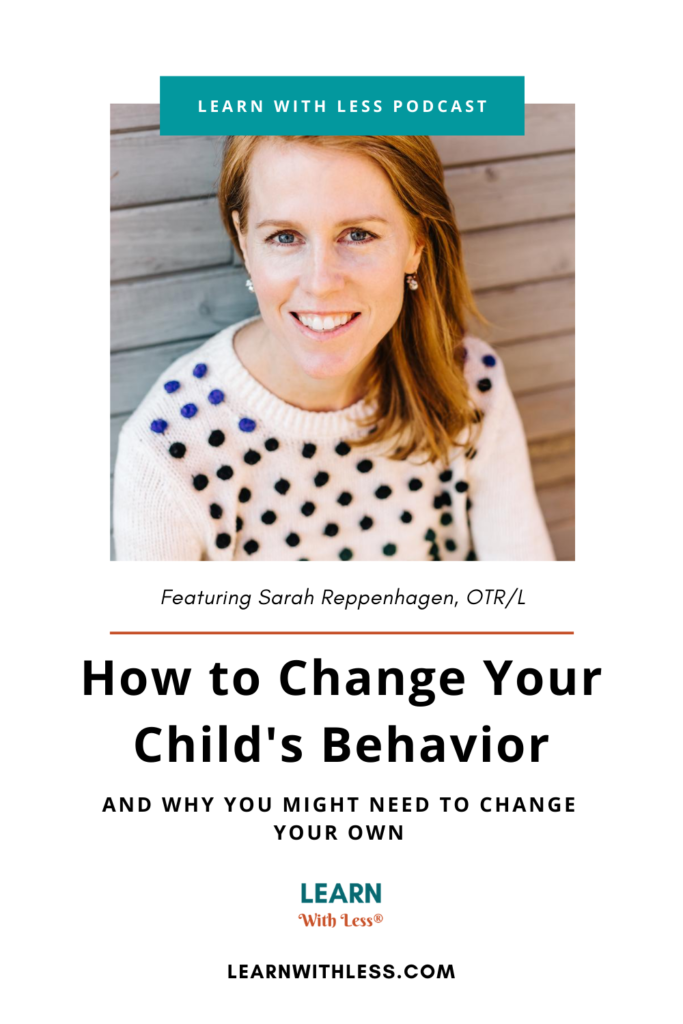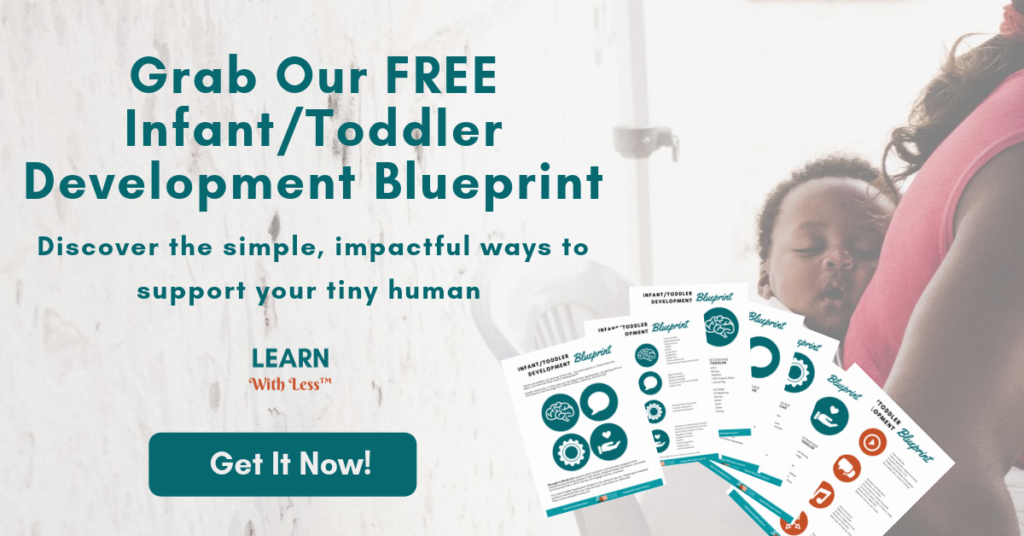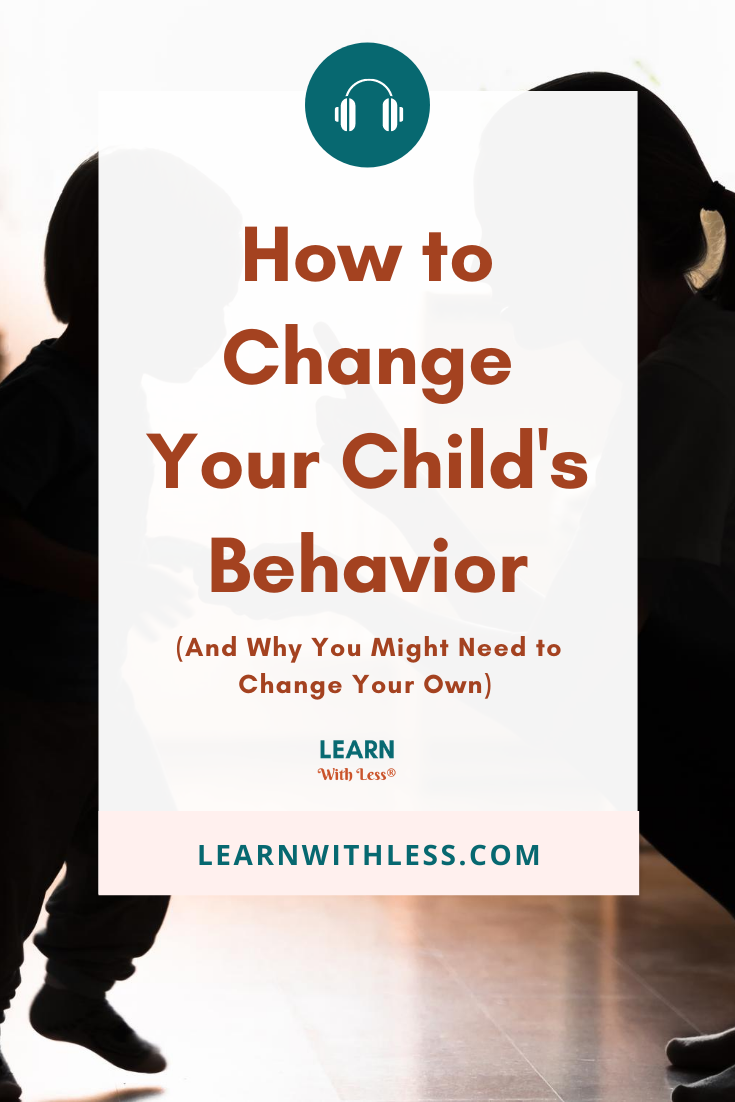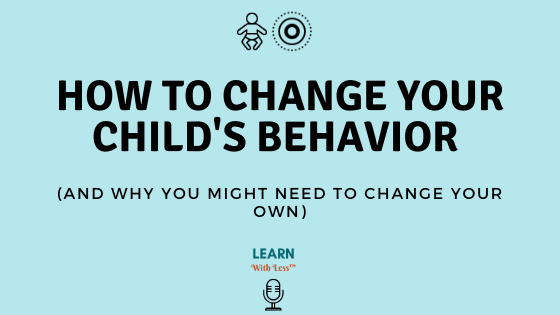What is Co-Regulation and How Can I Improve My Baby or Toddler’s Self-Regulation Skills?

In this episode of the Learn With Less podcast, Ayelet is joined by Sarah Reppenhagen, a licensed occupational therapist who has worked in a variety of pediatric settings, including Early Intervention, outpatient clinics, and inpatient hospitals.
Sarah’s passion lies in supporting young children and families to set the foundation for greater participation in life. She believes that all children have innate capabilities and the desire to engage with the people and environment around them. Supporting children’s emerging skills, as well as bolstering parent understanding during early development, sets the stage for further learning.
We discuss Sarah’s background and how she came to do the work she’s doing today, the definition of “self-regulation” and why it’s important to consider ways to support it in both parents and children, how our kids’ regulation and behavior is often a mirror of our internal state, the “stories” we tell ourselves about what our children’s behavior means… actually affects our ability to support them, and, of course, top tips and resources for supporting our children and ourselves through co-regulation.
Great resources we mentioned in this podcast episode:
Fostering Healthy Social and Emotional Development in Young Children (Tips For Families)
Still Face Experiment with Dr. Edward Tronick
Connect With Us
Ayelet: Facebook / Instagram / Pinterest
TEXT TRANSCRIPT OF THIS EPISODE
Ayelet: Today, I’m speaking with Sarah Reppenhagen, a pediatric occupational therapist and the founder of Gather and Grow, which is a pediatric practice supporting infants through preschool age children and their families, located in Portland, Oregon. Sarah’s passions lie in supporting development from the start, at a time when young brains are growing immensely and adults are evolving in their roles as parents.
Sarah believes that children have innate capabilities and the desire to engage with the people and environment around them, while parents have an intrinsic drive to connect with their child and nurture their growth. So, fostering children’s emerging skills as well as bolstering parent understanding during early development sets the stage for further learning and participation in life.
And Sarah, as you know, the work that both you and I are doing, it’s so much about, you know, how do we get our children to do these things? How do we boost our children’s development, how do we do this and that… And we also know that so much of it is about educating the parents. So I just love how you put that, and the focus that you have on parent education. So I want to thank you for being here!
Sarah: Thanks so much. I appreciate that. Yeah. I mean parents are the most influential factor in their child’s development and so yeah, bolstering their understanding and you know, they are the experts in their children, but sometimes they get to have a little bit more support to fully, yeah, support their kids’ development.
Ayelet: Yeah, exactly. And I love how you say that because anytime someone introduces me as a parenting expert, I cringe. It’s like nails on a chalkboard because… It’s not us. We are not parenting experts. I have two kids, I hope to be the expert on my two kids, but they are constantly evolving. But yeah, you’re the only expert on your children.
Sarah: Exactly. Exactly.
Ayelet: That’s what you’re trying to get to. Right, so I asked you to come onto the show today to speak to us about how to change your child’s behavior and what that has to do with the term self-regulation. But first, I just would love to hear a bit more about you and how you got into this, the work that you’re doing today.
Sarah: Yeah, so I have always been interested in child development for as long as I can remember. I started out babysitting early on in life and was always fascinated by kids, how kids really grow and develop into full fledged humans. And so I, you know, went to undergrad for child and family development and then pursued occupational therapy. And I’ve been practicing for, gosh, I think it’s 14 years now.
I’ve been in pediatrics the whole time, kind of in a variety of different settings. But I’ve really focused in on those early years through my work in early intervention and working in the neonatal intensive care unit, working closely with families and that environment. And yeah, just the opportunity to really work with just the child, but knowing that we’re not just focusing on the discrete abilities that a child has, it’s really about supporting the whole unit, which is, which includes the family.
Ayelet: Absolutely. All right. So let’s talk about this term “self-regulation.” How do you define it and why is it important to consider ways to support it in both parents and in children?
Sarah: Yeah, so self regulation is the way that we control our thoughts and our feelings and our behaviors. And it’s really important to develop that skill and it develops over a lifetime. So we’re born with, you know, some biology that supports that, you know, including temperament and our sensory processing abilities.
But really the bulk of that development happens over the lifespan, and even into adulthood, we are constantly working on our own self regulation and our kids give us a perfect opportunity to continue that development.
Ayelet: Well said.
Sarah: And so, so yeah, kids, especially little ones really rely on us to support their self regulation and that term, supporting another person’s self-regulation, is called co-regulation. And it’s really just this dynamic process of how one really influences the other. Yeah. But that self regulation is just so key to resiliency, long-term health, it has predictive factors for educational success, career success, relationships.
So relationships with our loved ones, but also, you know, how our own kids, the skills they’re learning now will support them in their own marriages and then when they become, if and when they become parents in the future. So it’s a pretty big deal, a pretty important thing to support. But in order to do that, we get to work on our own self regulation, and there’s times we do it better than others. For sure. I know for myself sometimes I got it down and other times I’m like, okay, I can’t really go regulate my kid if I… If the wheels are falling off in my own head.
Ayelet: Yes. And thank you for saying that because I think all too often we hear like, “don’t yell at your kid. It’s horrible for your kid.” And I hope that that’s not what people are taking away from this conversation, right? Of course it’s so important that we try, as we can, to regulate our own emotions, and that’s hard! So true. And actually in so doing, when we model that we’re not perfect and that nobody is perfect, that’s actually a great weight off of them in many ways.
If we can take the opportunity to show them that, “okay, I’m really sorry for yelling, maybe I shouldn’t have done that. Here’s a better way that I could do it next time. Now let’s talk about what we need to do, which is to get our shoes on and get into the car,” whatever it is, which that just happened to me yesterday. And then just giving them that opportunity to show them how our actions impact ourselves and each other, and that us noticing how we impact and how we notice that our actions impact each other.
So, okay, I would love to hear more about how our kids regulation and behavior is often a mirror of our own internal state. And when we were in discussion about having you come onto the show, you wrote something to me that really stood out and I just going to read it here cause I just think it’s so right on. You suggested that we talk about how the stories we tell ourselves about what our children’s behavior means actually affects our ability to support them. So let’s dig into this. Tell our listeners about what you mean by that.
Sarah: Yeah. So let’s, let’s go back to the mirror part first and that will lead into the story part. So, you know, on a biological level, we have these great brain cells called mirror neurons that allow us really to be great at co-regulating. And really what it does is allow us to be empathetic. So we have these mirror neurons at birth and they allow us to read somebody else’s emotions – from a primal level, really just to know if that person is a safe person or someone to, you know, be careful of.
Kids, even early, tiny little babies have this inborn ability to read our emotions as parents and often times respond by mirroring how we are feeling. And we have that ability to do the same for them. So you know, when a baby is crying, we reach down and we pick them up and we look in their eyes and we comfort them and we console them.
We might, you know, our voice might drop down, we might do some slow rocking movement. We do all of these things to come and soothe them, and they adopt our emotional state so they mirror our emotional state. Sometimes, you know, if we’re in a frantic mood and, or for, sorry, frantically running around and there’s a lot going on and we’re distracted, we might not have the same capacity to do that. And so that baby oftentimes or young child oftentimes can kind of read that we are disconnected and they might be acting out a little bit more than they ordinarily would and we also might have less capacity to soothe them in the moment. It might take a little longer or take more effort or be less successful.
And the other cool thing is that when we are successful as parents in soothing and calming and meeting our kids’ emotional needs, we get our own little dopamine hit that feels good. Like, Hey, I’m effective, I’m doing this really well, which then improves our own self regulation. And it’s kind of just this ongoing cycle that can positively really reinforce the other. There’s an interesting experiment that was done years ago, a “still face” experiment. I’m not sure if you’ve seen this, but it’s basically a baby…
Ayelet: I have – we’ll put it in the show notes cause that’s great.
Sarah: Yeah, it is fascinating. And it just illustrates really how even at a very young age, children can pick up on the emotional state of the caregiver and you know, mirror that emotional state. It’s pretty cool stuff.
Ayelet: Yeah, I know they recently did or there there’s been sort of replications of that where they did it with like a parent looking at their phone instead of just looking at the child. Which of course also has implications about when we’re distracted and looking at our phones instead of engaging with our children, we’re not able to co-regulate, right. And they’re often looking to us for help or attention or you know, power or whatever it is. And when we’re distracted, which of course we’re going to be in moments… Like this is the nature of our lives right now, but just to be more aware of what effect that has on our own children.
So, yeah. And I wanted to also going back to like, that’s mirroring like that, the dopamine hit of when we are effective. I had personally just such a hard time in my second with infancy because my second had silent reflux and he was just so physically uncomfortable. And until we sort of got it under control and figured out what was going on, he was just inconsolable. And I had never had that experience with my first, because I always got that dopamine hit and I could soothe him in different ways.
The implication of that for parents who are dealing with a colicky baby or medical issues of any kind and sensory issues when it’s really hard to decrease the stimulation and, and really help your child to regulate himself or herself, like, it is so hard. But keep going and keep trying and get to the bottom of it.
Sarah: Yeah, and that’s a great point. I mean there are times when there is an underlying situation that is making regulation hard. You know, there’s like skill based, like maybe they don’t have the skills yet developmentally or maybe there’s an underlying medical condition going on. Maybe they process sensory information differently and they can get easily overwhelmed.
And so if some of these co-regulation strategies that we’ll talk about, you’re feeling like, man, this is not helping, I’m not feeling effective, then it might be a good idea to kind of look at, dig a little deeper and see if there might be some other underlying reason for this and kind of get some extra help onboard for your kid but also for yourself because it can be really hard, as you know, when you don’t feel effective as a caregiver in consoling and soothing and co-regulating your child.
Ayelet: Absolutely. Well, Sarah, this is so exciting. We’re going to take just a brief break to hear a word from our sponsors and then we’re going to hear a few tips and strategies from Sarah about this very topic about co-regulation and then we’ll hear about her favorite resources for parents and caregivers interested in learning more.
Ayelet: Okay, Sarah, let’s get into it. We would like to hear your top tips for parents and caregivers who are hoping to better support their infants and toddlers and themselves through co-regulation.
Sarah: Yeah. So you hit it right on the head. It’s about, you know, supporting both, regulation. So I would say first and foremost is put your oxygen mask on. Really take care of yourself, because you’re going to be really the most effective at supporting your child’s regulation if you yourself are regulated. And nobody is regulated at all times, like many times throughout the day, you will notice your own personal rollercoaster.
But you know, if there’s practices that you have that allow you and that you know, support your own self regulation, then engage in those. So mindfulness, meditation, connecting with nature, you know, making sure that your biological needs are met and have you, are you eating and sleeping and getting exercise. I mean those are things that you’re making sure that your child gets, but also make sure that you are getting those as well.
And then you know, really in terms of supporting your child is… There’ve been a lot of studies that really support and show that, you know, coming from a place of warmth and sensitivity has such a huge, tremendous impact on self regulation. So again, it’s not like necessarily, I mean there’s strategies that you can put in place, but it’s your way of being and how you are showing up with your child that really best supports them and less about like the specific doing pieces.
Ayelet: Getting the background together, right?
Sarah: Yeah, exactly. Yeah. And then just looking at the environment, you know, are there things in the environment that maybe creating stress for your child or for yourself? Those things might need to kind of be switched up, depending on the day, and your child’s tolerance for that. Looking for those early signs of dysregulation. Kind of going back to that technology piece, it’s all a part, it’s a part of all of our lives as you said, but I’m really looking at that having a potential impact on your ability to get those early cues of dysregulation.
Sometimes we’re distracted and then, like I said, the wheels are sort of falling off and and things are, yeah, things are falling apart, but if you can catch those earlier cues, it’s a much easier to support that regulation and then just really hold space for your kids’ big emotions, like it’s okay for them to feel those things. It’s really an important part of their development and it doesn’t always mean that there’s something that’s wrong with them.
You know, sometimes we do make up those stories about what their behaviors mean, and it doesn’t mean that there’s something wrong with them or that there’s something wrong with you. It’s just a natural part of how we operate as humans. It’s one of the beautiful things that makes us human. So, allow for those big emotions and take note in yourself like, what’s coming up for me when my kid is having a total tantrum? Am I mirroring their emotion? And what can I do to self regulate in this moment so that I can best support them?
Ayelet: Yeah, I was just going to say that I find that trying to understand the underlying sort of “reason” of why my little ones, like what they actually need, what’s the underlying need can be really helpful for me because it’s, it’s like, okay, he needs more attention right now. He actually needs more connection with me, or if he needs to feel power over, you know, where he’s eating the food.
I did an, I had an Instagram post recently about like my older one was heading off to camp on my, and I was packing a lunch box and my younger one was like refusing to sit down at the table and eat his breakfast and was just pointing out the lunchbox and talking about the lunchbox. And I was like, okay, well here I’ll put some food in another lunchbox and he can stand and graze and eat his breakfast that way. And he did.
So figuring out what is the need, and serving that need for both of you in a way that is acceptable to both of you. And sometimes it does take getting out of the, you know, looking outside of the box in many ways. But that’s a great way to regulate our own emotions and figure out, you know, what’s going on from my kid and how can I meet him where he is to figure out how we can both be happy.
Sarah: Yeah, that’s so true. I mean it’s about like looking at that behavior as a way of communication versus, you know, creating a story or placing a judgment on what the behavior feels like or is. And I think just generally having age expected, having age appropriate expectations for your kid.
I think sometimes we forget that our kids are just still learning and even if they’ve shown that they, you know, have developed, done at once kind of right or done it really well once, it doesn’t mean that they always transfer that skill to another context or can do it the next day. It takes them so many times, it takes like thousands of hours to like learn to stand, it takes thousands of hours to learn and reinforce this emotional development as well.
Ayelet: And like you said, it’s still happening for all of us. We are… there are so many factors, you know, are involved in how well we can do it like sleep and how fed we are and you know, all of those things. So. Okay. That’s awesome. So what are a few of your favorite resources that you like sharing with families?
Sarah: Yeah, I mean one of my favorite resources just for general development, but that does touch on social emotional development is pathways.org and they have a lot of really great free online resources for families. I also, I know that you recently did an interview with Dr. Laura Markham. I’m a big fan of hers. I think she’s got some great resources around, you know, social/emotional regulation. So she is a really good support. I mean, there’s so many amazing…
You, right? There’s so many amazing people out there that support parents and, you know, I think it’s finding those people that really speak to you, and the way that you want to parent. So there’s not necessarily like one, right. And one specific person to follow or to act as your guide. It usually takes a village and a community.
There is, if you want to learn a little bit more about this specific topic, I can send you a link. But Duke Center for Child and Family Policy has some really good resources, to learn a little bit more about self regulation in general and how to co-regulate as parents.
Ayelet: Yeah, and we’ll link to the, we’ll do that in the show notes as well if this episode. That’s awesome. Sarah, this has been so helpful. Thank you so much and thank you to all of our participants of the Learn With Less™ Curriculum online program who are here listening live. We’ll continue the discussion and open up for a Q and A session with you guys in just a minute, but for everyone listening from home or on the go, thanks so much for joining us and we will see you next time.


